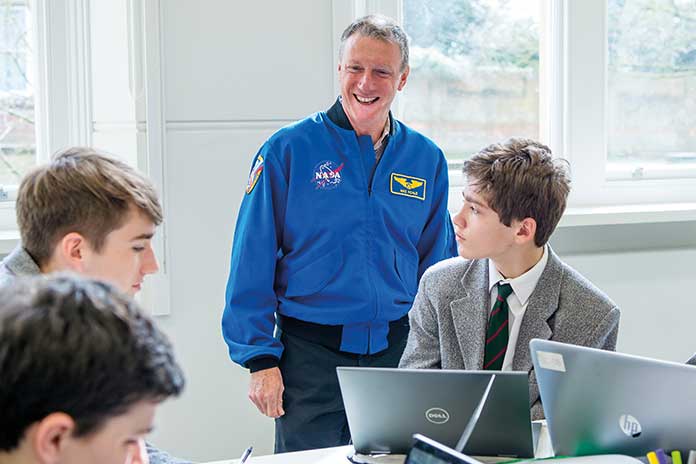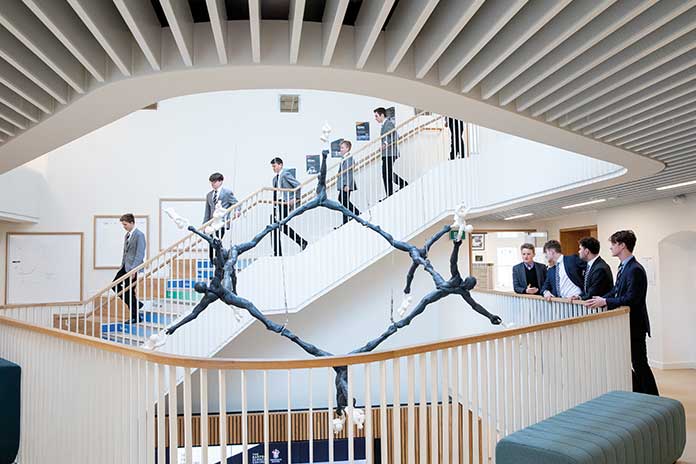Tonbridge School has a bit of a dilemma. This esteemed and historic boys’ school in Kent is quietly confident, yet somehow very English in its reticence to proclaim its achievements too loudly.
“We have never been a headline-chasing school,” says Headmaster James Priory. “But on the other hand, I’m really keen that people realise the excitement of what is actually going on here.”
In other words, Tonbridge has something that it really wants to shout about.
And shout it should, because not only does the school have an incredible new £19m Science Centre to show off, it has just become the first UK school to host Mission Discovery, an event that gives pupils the chance to work alongside renowned scientists and NASA astronauts.
In mid-March the first British NASA astronaut and astrophysicist, Dr Michael Foale and International Space Station commander, Dr Steve Swanson were two of the astronauts who visited Tonbridge for a week of inspiring talks and competition in an event organized by the International Space School Educational Trust (ISSET).

Pupils from Tonbridge, plus six other local state and independent schools – Tunbridge Wells Girls’ Grammar School, The Marsh Academy, The Judd School, The Skinners’ School, Skinners’ Academy and Weald of Kent Grammar School – had a mission to create an experiment which, if chosen as the winner, would be built by King’s College London and NASA and launched to the International Space Station where it would be carried out by astronauts currently on the ISS.
James Priory says it had been “an extraordinary privilege” for all at the school to work with the astronauts. “Hosting Mission Discovery means that we have had an ‘intellectual laboratory’ here at Tonbridge, and I’ve been incredibly impressed with the ideas, energy and innovation on display. It’s been a fantastic week and has, I hope, been both fun and inspiring for everyone who took part.”
More than 30 experiments have gone to the ISS from Mission Discovery but this is the first time English schools took part. Past winning entries include work on genetics, Parkinson’s disease and Alzheimers. The grand final at Tonbridge saw the Argonauts’ team crowned winners. It consisted of five pupils from the Lower Sixth at Tonbridge and Tunbridge Wells Girls’ Grammar School. The students designed an experiment to discover whether yeast is able to undergo sexual reproduction in the microgravity environment of the ISS.
Mission Discovery week was also a perfect opportunity for the official launch of the school’s new Barton Science Centre, which opened for teaching in January 2019. Named after British organic chemist Sir Derek Barton, an Old Tonbridgian who won the Nobel Prize in 1969, the uber-modern three-storey cuboid glass and steel structure sits amidst the historical buildings of the school. Inside, its state-of-the art classrooms, brimming with 21st century technology, merge seamlessly with many original architectural features. For a school it is quite a statement of intent.
“We are literally putting science and technology at the very heart of Tonbridge School,” says Head of Science, Bill Burnett.
“We believe very strongly in two things. Firstly, that in an increasingly technological society facing all sorts of urgent global challenges, every young person needs to be equipped with a good understanding of science. Secondly, to meet those global challenges, we need new technologies based on a new generation of young scientific minds. Tonbridge, as an institution, wants to help inspire that new generation.”
The building houses the departments of Chemistry, Biology and Physics which each have their own floor with greatly expanded facilities, including new laboratories and classrooms. Other facilities include an interactive periodic table – which looks more like a YBA art installation – a giant TV wall, a beehive, a roof garden, a greenhouse and three departmental libraries. Mainly it is just very very beautiful. The classrooms and main atrium are bathed in natural light and the central staircase – colour coded with the essential elements – swirl around Briony Marshall’s extraordinary sculpture, Barton’s Chair, which hangs in the central atrium. It is a large-scale model of the chair isomer of the Cyclohexane molecule, the geometry of which was discovered by Sir Derek Barton.

It is a stunning building, but Philip Deakin, the Head of Physics and our tour captain is quick to point out: “The building shouldn’t just look pretty it must work, too.”
And work it does. What impresses most about the new science centre is how every tiny, practical detail has been carefully thought through. Deakin helped design the physics labs, each of the rooms is totally different. In the one we visit, the set up is flexible with interlocking globular desks which can be moved to create any number of different formations. They are higher than average, too. Deakin explains it is much easier to create a pulley to demonstrate Newton’s laws of gravity with a desk that is 94cm high rather than 65cm. And strange tower-like structures are dotted around the room – which Deakin affectionately labels his ‘power daleks’ – they are upright, mobile power points that can be pushed anywhere for easy plug ins.
Deakin says: “Having worked in a London office, a North Sea oil rig and two previous independent schools this is the most exciting environment I have worked in.”
“It’s about enabling teachers to make it as easy as possible to teach,” he says. It’s also about creating an environment that uses every single opportunity to educate and enthuse students about science. For example, on each floor there is a library dedicated to that department. Not only are there well designed desks with lights and laptop plug ins, but there are carefully chosen books, and pictures of famous faces from these disciplines, complete with famous quotes.
“If we can make an environment that boys want to be in,” says Deakin, “that’s half the battle won.” And it appears he’s winning. Deakin shows us a physics lab where he has installed a coffee machine as an enticement. He says he will often find a boys there early in the morning, having a coffee and tinkering with their own projects.

Deakin is a hugely impressive teacher. It’s teachers like him who are having an impact at Tonbridge. 50% of boys are doing a science A-Level, 40 students in each year group are taking physics and 30 of the cohort leaving in the summer will be doing engineering or physics at university. That’s quite a rap sheet.
Priory is ill at ease boasting about his school’s prowess. A mild-mannered and thoughtful man, he confesses to a strong interest in natural history and admits to being something of a twitcher. But he’s clearly proud of his new charge – “There is some amazingly innovative practice here,” he says. Tonbridge is where mindfulness developed, for example. Richard Burnett, one of the housemasters developed the Mindfulness in Schools Project and now teaches mindfulness in the Houses of Commons and Lords.
Priory is settling into life at what is his first experience of a boarding school. “What I have found really interesting is that the perception of the school is that it’s about being very alpha male, very sporty and very academic. There are people who fit that description, of course, and sport is a big part of life here but the reality is it’s a lovely community, very supportive, very friendly.
“It’s a school that genuinely accommodates a huge range of individuals, and encourages them to put their learning into action” says Priory.
A few evenings before we meet, Priory says he attended a charity concert put on by a sixth-form pupil. “I knew he was leading a concert and I thought, ‘Oh well I’ll go along and be supportive.” I had no idea… I’d not clocked he was doing Faure’s Requiem, he had created an orchestra and a choir with support from staff and friends from the school. It was an extraordinarily ambitious programme. The boy raised £4k for a charity and he’d literally had this idea in September and made it happen. That’s the kind of ‘wow’ that I’m experiencing here,” he says.
The school is soaring academically. The number of A* achieved at A-Level is dizzying. Registrations are up, with increased interest from London. Currently a third of boarders come from the capital but this is surely going to spiral upwards with the new science facilities on offer.
Priory says he’s keen to sustain the academic record but also “to take advantage of the time and space we have to really develop the intellectual life of the school even further.”
He is currently reviewing the school’s sixth form curriculum in light of the move towards linearity with A-Levels.
“If over time students reduce their programme to three A-Levels, we want to be sure boys are taking up enrichment opportunities and other chances to develop life skills so it doesn’t become a reductive programme.” This includes the possibility of introducing the EPQ and other non-examined subjects in the sixth form.
Co-curricular is strong at Tonbridge, as you would expect. Beyond the sports fields there is a “strong interest in conservation”, says Priory. Boys learn land management and rural skills such as coppicing, woodcutting, livestock management and even beekeeping. They then put their skills into practice on the school grounds and work on local estates.
Volunteering is also an integral part of the Tonbridge ethos; it isn’t compulsory, says Priory, but “it’s very popular”. The school’s outreach programme, Tonbridge Community Action, every Wednesday afternoon, ranges from primary schools visiting Tonbridge for weekly science lessons to Tonbridge students working with young refugees in local detention centres.
Priory says this focus on social issues extends to the school itself and one of his priorities is to widen access. “We’ve been lucky enough to go through a major programme of capital development in the last decade. We’ve got to realise that potential now,” he says.
“We have to be aware of the privilege that we enjoy and the resources we have. To value that and to understand the responsibility that brings – that’s certainly the ethos I have found here and I’d like to maintain that,” he says.
The school already runs a Junior Foundation Scholarship programme which identifies bright young people in Year 6 and supports them with their education through to Year 9 (often by financing a move to a local prep school) and helping their integration into Tonbridge.
Priory says this scholarship programme must grow over the next few years and the school is looking at ways to fund this.
Basking in the glory of a hugely successful Mission Discover week, Priory has a clear vision of where he wants to see the school go. “I want to develop the boys’ confidence, prepare them to take a leading role in life at university and beyond. We can’t be complacent about anything.”
Visit Tonbridge School’s website here
Find more information about the School here
You may also like...

























